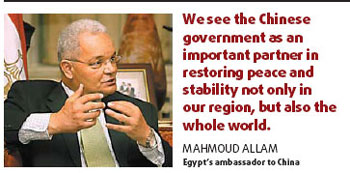Mahmoud Allam does not only look like a sportsman, but also love sports, especially outdoor activities like hiking, tennis and, hold your breath, Chinese Taiji. He feels happy and content after exercising in open air, says Egypt's ambassador to China.
Allam hopes he could carve out more time to practice Taiji, a Chinese martial art devised by Taoist priest Zhang Sanfeng about 700 years ago. "My Taiji master is a strict disciplinarian and has told me that I should be more regimented," he says. "I'm supposed to practice at least half an hour a day, but my tight schedule sometimes doesn't allow me to enjoy such luxury."
Allam loves practicing Taiji because he likes the idea of harmony, which is the basic element of Taoism. A Taiji player should have a peaceful state of mind, feel calm and relaxed and put aside sundry thoughts so that he can concentrate completely on it.
"Even if you are faced by force, you don't have to answer by force. You can let the force consume itself," Allam says, adding that his elder son also loves Chinese culture and always likes to visit China to spend time with him.
Allam has always been on the lookout for more medieval links between Egypt and China because they are among the two of the oldest civilizations. In fact, he is thinking of organizing a seminar on Zheng He, the famous Chinese sailor during the Ming Dynasty (1368-1644).
Allam believes there is a strong possibility that Zheng crossed Egypt and reached the Mediterranean Sea and southern Italy. He says Zheng is likely to have traveled on the Nile River because a lot of Chinese porcelain has been found along its banks.
(China Daily July 27, 2007)





